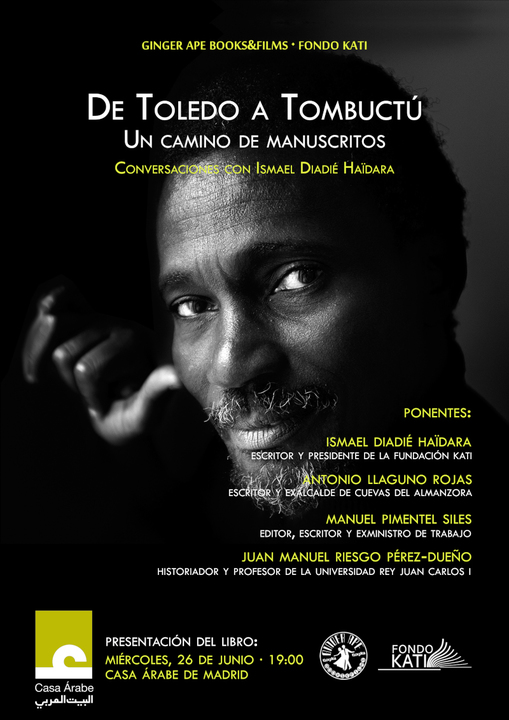Books and publications
Index / Activities / Books and publications / From Toledo to Timbuktu: A road made of manuscripts
From Toledo to Timbuktu: A road made of manuscripts
June 26, 20197:00 p.m.
MADRID
Casa Árabe Ambassadors’ Hall (at Calle Alcalá, 62, First Floor).
7:00 p.m.
Free entry until the event’s capacity is reached.
In Spanish.
This Wednesday, June 26, we will be holding the presentation of this book of conversations with Ismael Diadié Haïdara, at Casa Árabe’s headquarters in Madrid.
Taking part in the event is Antonio Llaguno, co-author of the book and a former mayor of Cuevas de Almanzora; Ismael Diadié Haïdara, the book’s co-author and director of the Kati Fund (Fondo Kati); Juan Manuel Riesgo, a historian and professor at the Universidad Rey Juan Carlos, and Manuel Pimentel, author of the book’s foreword, an editor and a former Minister of Labor.
Timbuktu, in Mali, is one of those cities with an extremely valuable historical and cultural legacy. For centuries, Ismael Diadé’s ancestors safeguarded one of the libraries which best preserves the legacy of the descendants of the people of Al-Andalus who were forced to go into exile from the Iberian Peninsula and leave for other geographical locations. Through the conversations with Ismael Diadié brought together in this book, we get the chance to learn more about what this collection of manuscripts and texts has meant, as well as the family history of those who traveled the world with them in the attempt to keep them safe. Because of this library’s survival up to the modern day, the history and memory of those who left what is now Spain in the fifteenth century remain alive.
Presentation information sheet
Ismael Diadé, born in Mali, is a historian, philosopher, expert on cooperation and the director of the Kati Fund, which houses the most extensive legacy from Al-Andalus outside of our country. He is a descendant of Ali ben Ziryab al Kuti, who was forced to leave Toledo in 1468, taking with him one of the most important libraries from the era of Al-Andalus in order to safeguard it until our modern day.
Antonio Llaguno has a bachelor’s degree in Psychology and was mayor of the Almería province town of Cuevas de Almanzora for 12 years. He is currently the Managing Director of the publicly owned company Desarrollo Agrario y Pesquero (Agrarian and Fishing Development) of the Autonomous Regional Government of Andalusia and the representative of the Kati Fund in Spain. His efforts to help the population of Timbuktu are noteworthy, having promoted humanitarian aid and working so that the Autonomous Regional Government of Andalusia would build a library to house the Kati Fund.
Timbuktu, in Mali, is one of those cities with an extremely valuable historical and cultural legacy. For centuries, Ismael Diadé’s ancestors safeguarded one of the libraries which best preserves the legacy of the descendants of the people of Al-Andalus who were forced to go into exile from the Iberian Peninsula and leave for other geographical locations. Through the conversations with Ismael Diadié brought together in this book, we get the chance to learn more about what this collection of manuscripts and texts has meant, as well as the family history of those who traveled the world with them in the attempt to keep them safe. Because of this library’s survival up to the modern day, the history and memory of those who left what is now Spain in the fifteenth century remain alive.
Presentation information sheet
Ismael Diadé, born in Mali, is a historian, philosopher, expert on cooperation and the director of the Kati Fund, which houses the most extensive legacy from Al-Andalus outside of our country. He is a descendant of Ali ben Ziryab al Kuti, who was forced to leave Toledo in 1468, taking with him one of the most important libraries from the era of Al-Andalus in order to safeguard it until our modern day.
Antonio Llaguno has a bachelor’s degree in Psychology and was mayor of the Almería province town of Cuevas de Almanzora for 12 years. He is currently the Managing Director of the publicly owned company Desarrollo Agrario y Pesquero (Agrarian and Fishing Development) of the Autonomous Regional Government of Andalusia and the representative of the Kati Fund in Spain. His efforts to help the population of Timbuktu are noteworthy, having promoted humanitarian aid and working so that the Autonomous Regional Government of Andalusia would build a library to house the Kati Fund.

